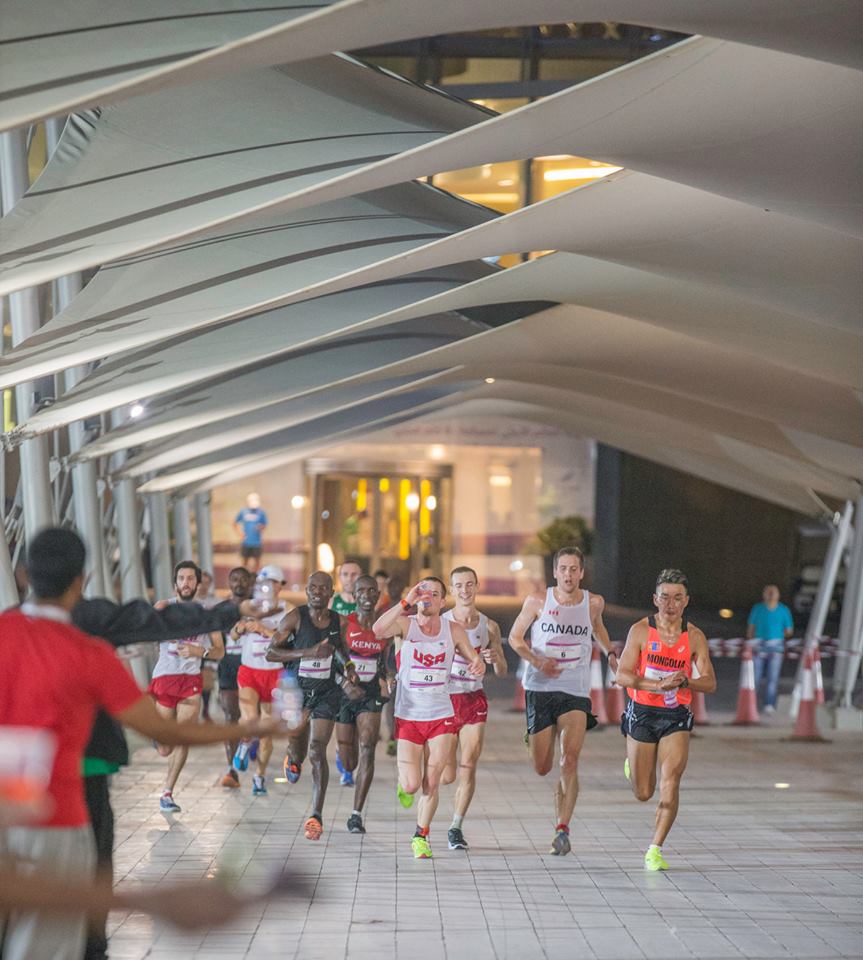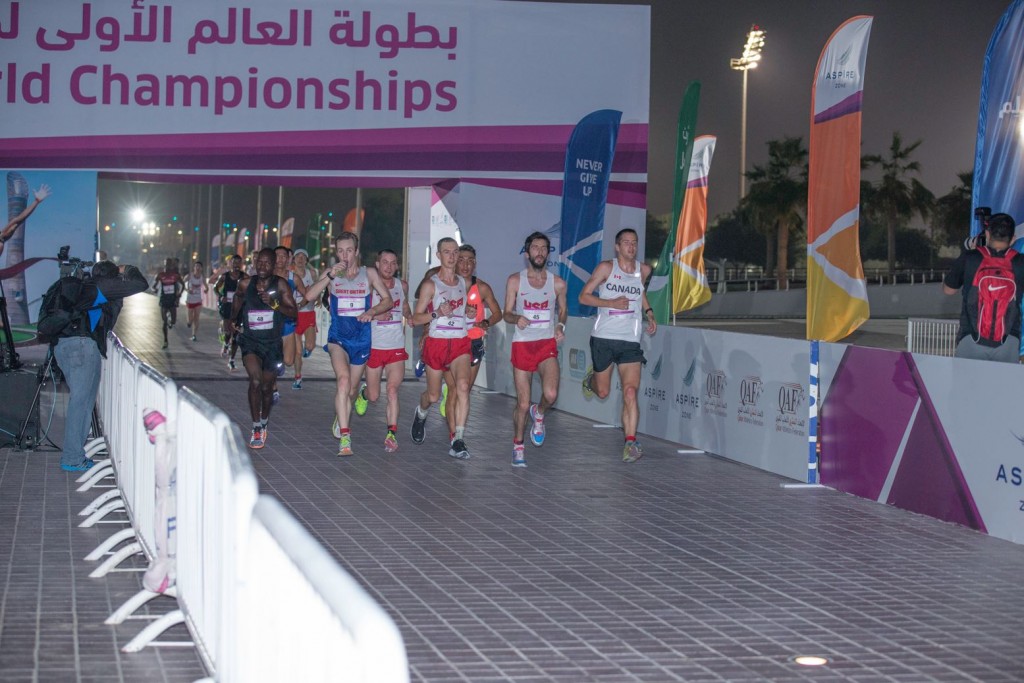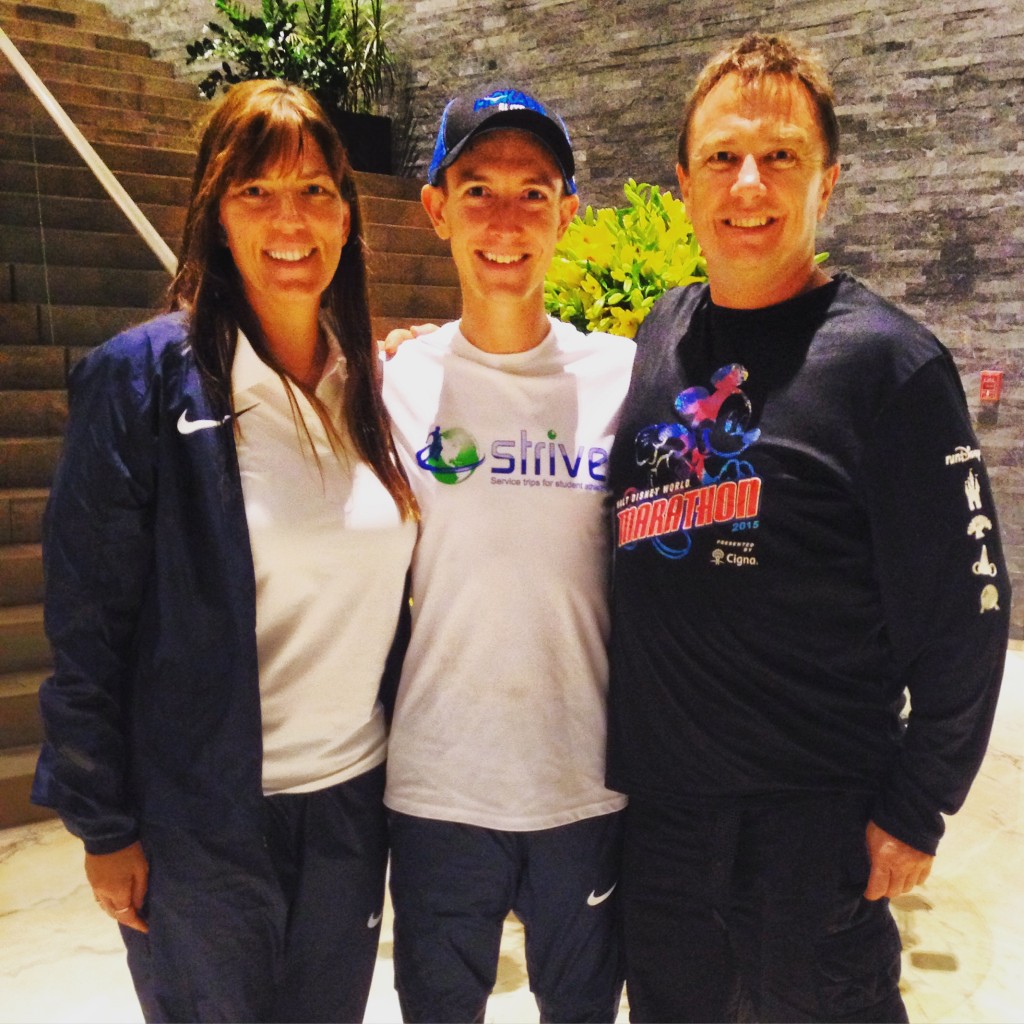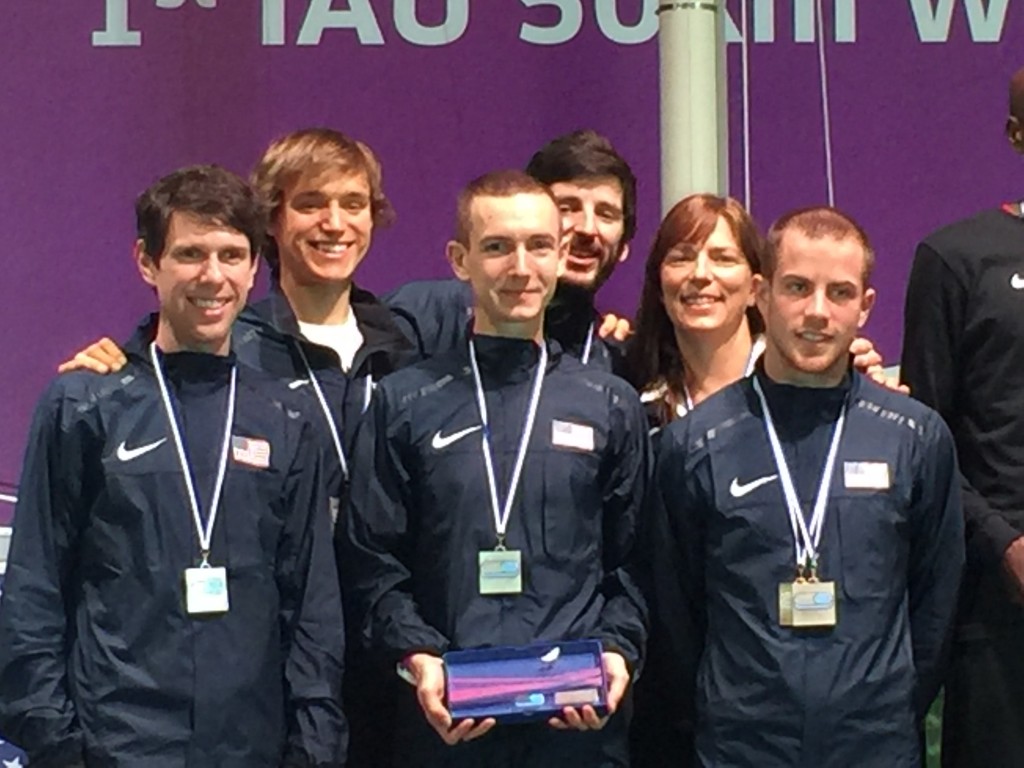This is the moment – the first decision point.
We’ve just passed 15km, the third of ten 5km loops at the 50km World Championships in Doha, Qatar – and the running has slowed to a pedestrian rhythm. Apparently fed up with the large lead pack and dawdling pace, John of Zimbabwe surges to the front of our group for the first time and opens up a small gap on the rest of the field. As we run through the parking lot and turn left onto the brutal cobbled-brick kilometer, the three Kenyan teammates make a strong surge and quickly catch up to John.
“This is real,” I say to my teammate, Tony Migliozzi. “But let’s be very careful how we react. I don’t want to sprint up like the Kenyans just did. Let’s gradually accelerate, see how fast we’re running at the next kilometer marker and reel them in slowly. There’s a long way to go.”
I’ve never been more well-prepared for a race – for a particular moment – than I am right here, right now. Over the past four months, my coach and I had extensively discussed a potential early break-away and how I ought to respond. We’d experimented in training – running long runs with very sudden accelerations (as my Kenyan competitors have just done) and more gradual, controlled accelerations, as Tony and I are now undertaking. I knew the pace would be uneven. I’d practiced it. I’m ready and I’m feeling fantastic. The first three laps felt like an extended warm-up. And now, as Tony and I begin to leave the safety of the herd for the first time, it actually feels good to let my legs open up, increase my cadence, feel my breathing deepen.
We make the 180 degree turn, the wind at our back now, and the sweat begins to drip off of us like we’ve stepped out of the pool. We’d run the last kilometer in 3’20 (5’20/mile pace). Perfect.
**
The day began in the early afternoon. Between the jet-lag and evening race time, I was glad to have slept until close to 1pm local time and felt great as I headed out for a post-coffee shakeout jog. Somehow, in the past 36 hours a small city of perfectly assembled tents and buildings had sprung up – like bacteria on a petri dish – around the start and finish line. Doha reminded me of Jurassic Park’s Paul Hammond – “I spared no expense.” Smiling – loving the bigness of it, the over-the-top-ness of it all – I trotted along the last kilometer of the course, the Middle Eastern sun high above.
Back in the room, Tony and I killed time, chatting aimlessly as we prepared our ten fluid bottles, listened to music, and munched down any last snacks to settle our stomachs before we headed down to the start. Showtime.
Susan and the rest of our support team had been at the aid station for hours already – not only stocking the table with water, ice, and gels, but also decking the zone out with giant USA banners and flags. At least we knew we had the best support crew. This is too cool.
With my number pinned onto my brand new USA singlet, I pulled it on and took a deep breath. Another shot of adrenaline. This is the moment.
Needing no more adrenaline, I listened to Ira Glass rip on Frank Sinatra’s “My Way” as I jogged for a few minutes – just enough to get the legs loving, the heart pumping, the sweat beading. Before I knew it, officials were herding us into the fenced off starting area – cattle headed to the slaughter.
Inside the pen, I observed the competition, noting the nervous energy projecting out of every shake of the leg or twitch of the mouth – a habit I’d picked up to help calm my own nerves. A European runner hammered a few short sprints while I bounced in place. My warm-up is perfect for me: a constant stream of positive self-reinforcement.
With a few minutes to go, Zach and Tony and I congregated and I shared my thoughts.
“I want us to get to the front in the first few hundred meters and just form a wall and control the race. We have five runners here – hardly another other team does – and none has five as strong as us. Let’s make this our race. Patience is the name of the game today. The longer we can keep the pace conservative and keep all five of us in the lead pack, the better we’ll do as a team. Let’s make this a 20k race.”
Agreement all around, we were herded to the start line. The usual nervous bouncing energy pervaded over the crowd of already-sweaty bodies. Finally, the horn sounded and we were off.
**
I’m not even thinking about those first three laps. 15K moderate – that’s how I would have described it in a workout. Now, it’s time to start ramping things up – but gradual is the key. Patience.
Tony and I have broken away from the rest of the group, with only the three Kenyans and one Zimbabwean in front of us. The pace is perfect – right around 3’20/km, which is the top end of what I feel comfortable running this early in the race. By 18km, we’ve caught up to the pack of African runners, but they’re continuously surging, trying to drop us or tire us out. Neither of us fall for it, maintaining a steady rhythm, happy to let them exhaust themselves.
We come through 20km having run the fastest lap of the day thus far – around 16’45 for 5km. The effort certainly requires more focus than the previous laps, but I have no doubt that I can maintain something close to this for the next 30km. Tony is feeling great and we’re still talking constantly – discussing strategy. I implore him to hold back, have patience, and not try to follow the Kenyans’ every move.
Again, they pull away, but by 22km we’ve caught back up by running consistently. I honestly don’t care what happens over the next 8km. My goal is the same as it was at the start – get to 30km and then start to really focus. I know we’re running faster, so I want to just maintain my pace and effort, and not worry about the other runners around me. As I’d seen in my only other 50K at the US National Championship in March, seemingly insurmountable leads can be lost in just a few kilometers at the end of an ultra-marathon.
And so, I wait. I let the others go. I catch my breath. I continue taking fluids each lap, gels every 10k. I’m quite warm but ice and water from the aid stations seems to help. I’m feeling great. I’m confident. I have enormous faith in my plan and my training. And I have equally enormous faith that the pack of Africans will struggle in the final stages of the race after all this early surging. I’m in 6th place right now. I’m going home with a medal; I’m sure of it.
As I approach the end of lap number six and the 30km mark, I’m ecstatic. This is just like Hartford. This is going to be great.
This is not going to be great.
As I cross the Rossi mat at 30km, I press the lap button on my watch (still on perfect, comfortable pace), suck down my third gel, and begin to actively increase my turnover. My feet already hurt from 30km run on cobbles, tile, and concrete, but the initial gear-shift feels just right. My legs feel fresh. This is it. This is what you’ve trained for. This is how it’s supposed to feel.
This is not how it’s supposed to feel.
After less than a kilometer, something changes. My body suddenly refuses to cooperate. It starts with a pain in my chest at the bottom of my rib-cage, perfectly in sync with my now deeper and more rapid breathing. Each breath summons pair of pocket-knives, jabbing into my torso. This is new; this is alarming.
I’m having a heart attack. Heat stroke. What the fuck is going on?
I try to cough, relax my chest, shake out my arms, relax my face, but nothing helps. My breath is growing shallower and I can feel my legs and arms begin to revolt – deprived of the oxygen promised them. My cadence slows as I try to catch my breath, the lighter effort a brief respite.
But even this is unsustainable. I jog a few kilometers, running the slowest lap of the race thus far, but instead of the effortless feeling of the initial laps – my breathing calm, conversation, a friendly ping pong rally – I’m gasping for air. Something has irreversibly changed and despite everything I try – slowing down, massaging my chest and neck, forcing myself to breathe through my mouth or nose alone, nothing helps. It’s over.
**
At the finish line, I’m on the ground.
“I can’t breathe,” I say.
Alex is there, helping me stand up.
“I can’t breathe,” louder this time.
Diana is there too and remembered that I have an inhaler in my bag, just in case of something like this. She quickly returns with it, holding it to my lips. Almost immediately, my chest seems to relax. My body greedily tries to suck all the oxygen out of the air.
I’m still dizzy and out of breath just walking and Alex and Diana get me seated and someone from medical comes over – a giant machine on his lap as he sits in front of me. He measures my oxygen saturation (low), pulse, and blood pressure, and I’m taken to a tent and given oxygen until readings return to normal.
As I begin to accept the fact that I’m not going to die, my brain changes gears and is overwhelmed by extreme disappointment. The last three laps had been brutal. Each minute, I had considered dropping out (“Why am I still doing this?”) but I thought back to a conversation last weekend with my brother:
“Have you ever dropped out of race?”
“No.”
I was pretty sure I wasn’t going to die; if something really terrible had happened there were staff and other runners all over the course. So, the only thing I had to deal with was the temporary pain of those last few miles. I had given up on finishing in a time or place with which I’d be satisfied; I was just avoiding those worst and most permanent three letters: D.N.F.
**
I’d had an asthma attack. In the past, I’ve had seasonal issues with asthma due to a fairly severe pollen allergy in the US spring, but had never had such a significant breathing issue. Doctors and some reading had told me that it could have been caused by any number of things: extreme heat and humidity, fine desert dust in the air, local pollens that my body was allergic to and not used to, all combined with intense exertion and an increase in the depth and frequency of breath. Whatever the cause, it had rendered my body unable to deliver oxygen, leaving the giant engine I’d fine-tuned over the previous months without a fuel supply.
Sitting in medical and breathing oxygen, my body finally returning to homeostasis, I find out that Tony won the race. Amazing. His first ultra! My roommate! My peer!
But I can’t pretend it doesn’t sting. I’m too small to not smother my happiness for Tony in a thin coating of jealousy. It burns – a physical sensation, like cracking your elbow on the corner of a table, trying to hold back tears.
This is the nature of our sport. Months of monastic life and thousands of miles and gallons of sweat and all those brutal moments in those hardest runs where you tell yourself: it’ll be worth it, it’ll be worth it. All of that tied up in one day, a couple hours.
When it works, it is so worth it – worth it over and over and over. That moment of redemption – five thousand miles culminating in perfect execution, everything coming together when it matters most. It’s the greatest feeling I know.
But when the day is lost, when an injury pulls the rug out from under you before you even get to the race, when everything comes crashing down during the one run of the last six months that really counts – it can be equally (or even more) devastating.
This isn’t basketball. I can’t redeem myself at tomorrow night’s game. This race won’t disappear in a sea of other data. Maybe, I’ll get a chance next year. A year is a long time.
**
The next day, I’m white-knuckled in the passenger seat of Susan’s car as we navigate the gauntlet of Doha’s highways and roundabouts. I love Susan; I feel a familial bond (we’re driving to pick up the laundry Susan had done for me) but I also recognize that she treats me as a peer, an adult.
“Zach was in the best shape of his life; I’d never seen him so fit,” Susan tells me, describing a race by her friend and coach Zach Bitter at the 100km World Championships a few months earlier. “And he was looking fantastic, moving up through the race in the second half, just like he did the year before, but he was ten spots of ahead of where he’d been last time. I’m sure he was on pace for a medal. And then he didn’t show up to the aid station at 85K. I was freaking out. It was over an hour before I heard anything and all that I got was that he was in the hospital.”
“Jesus.”
“Finally, I find out that he’s okay, but he’d had an asthma attack, too – the first in his life – and had to be taken to the ER.”
“It could be worse,” I say.
“But the thing that surprised me was how he acted afterwards. I was trying to console him, figure out if he was upset, and he wasn’t. At first, I thought it was just his public face, so I made sure to ask him again when we were in private, really tried to soft-ball him an opportunity to complain, but he never did. All he said was: ‘That’s how our sport goes. Some days go well; some days go poorly. You’ve gotta take the good with the bad. Let the bad days roll off;’”
“I wish I had that maturity,” I say, laughing, not sure how much is a joke. “But it’s easier said than done to just let it roll off like that. It’s so hard not to take a bad result as an indicator of how worthwhile this all is, all this energy poured into a few days each year. Sometimes it feels like every race is a validation of what I’m doing. And when something goes wrong, it makes me question what I’m doing with my life.”
I know she’s right, and Zach’s right. This race didn’t go as planned. In fact, it went worse than I had even considered. But now I have to let it roll off. I will let it slide off my skin, the cleansing of a hot shower rinsing away the salt and dust, leaving me refreshed, ready for what’s next.
So, I try to control the sting that comes when I think about what could have been during those hours on that Friday night. I bury that sting deep beneath the mountain of joyful of memories – those created on this trip and those from the days when things really did go as planned, when I was sure it was all worth it. I focus on the tangible, reinforcing the facts that I know for sure: I helped Team USA win a World Championship Silver Medal. I’m in incredible shape. I’m making incredible friends. I’m staying in an incredible five-star hotel in an incredible city on the opposite side of the globe.
This is the moment. Right now. The moment of Friday night has come and passed. Now, this is catharsis – the moment that I learn and grow and let go and smile and move on. And while those 32,000 steps in Doha didn’t carry me as far as I’d hoped, I’m grateful for every moment in my life. As one of my best friends recently reminded me, “this whole life thing is a limited time offer.”
As I finish this essay, proof reading, adding some photos, I leave my frustrations behind. Now, I will look back on this trip with joy, with love, and with pride. And as I look forward, I will focus on the now. Because this moment is the beginning of what’s next.





Leave A Comment